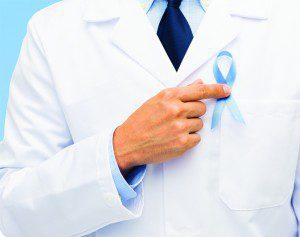Meir Daller, M.D.
 If you are a man approaching middle age, make it a priority to get to know, love, and care for your prostate. Ignore this little organ at your peril! Roughly half the male population of North America and Western Europe will have enlarged prostates by their mid-50s. And prostate cancer remains frighteningly common.
If you are a man approaching middle age, make it a priority to get to know, love, and care for your prostate. Ignore this little organ at your peril! Roughly half the male population of North America and Western Europe will have enlarged prostates by their mid-50s. And prostate cancer remains frighteningly common.
What is the Prostate?
The prostate is a gland, about the size of a walnut, found just below a man’s bladder. It releases seminal fluid, and during orgasm, contracts to allow ejaculation. Unfortunately, as men age, the prostate often enlarges, sometimes up to four times the size it would be in a healthy 20-year-old. This is largely the consequence of natural hormonal changes, especially the decreasing levels of testosterone and its conversion into DHT.
Tips to Avoid Prostate Trouble
Prostate trouble can be distressing (having to get up three or four times a night to urinate, suffering from unwanted leakage at work, and so on), as can the medical examinations and treatments. To avoid these problems, not to mention prostate cancer, try the following:
1) Exercise Regularly.
Exercise helps boost the immune system and reduce stress. But make your exercise gentle. Do not take up cycling or riding horses, as these activities can damage the prostate. Yoga is particularly good. If you attend a class, ask your teacher if there are any exercises she would recommend, especially those that target the pelvic area.
2) Reduce the amount of eggs you consume.
Researchers at Harvard University conducted a study into 1,000 men in the early stages of prostate cancer. They found that those who ate an egg a day doubled the risk of their cancer metastasizing. The culprit is thought to be a compound known as choline. According to Dr. Michael Greger, an American physician and author of How Not to Die, who quotes from the Harvard study in his book, choline may also increase your chances of developing prostate cancer in the first place.
3) Eat plenty of seeds.
Sunflower, sesame, pumpkin, and above all, flaxseeds are all good for the prostate. They are packed with essential fats, but more importantly, they contain zinc, which is vital for a healthy prostate. Flaxseeds are also packed with lignans, proven to slow the growth of prostate cancer cells in petri dishes and possibly in human bodies as well.
4) Eat lots of tomatoes.
Tomatoes contain lycopene, a substance known to prevent prostate cancer. But to enjoy maximum benefit, you need to cook them, as the lycopene is released when tomatoes are heated. Since garlic and olive oil are also good for the prostate, try frying tomatoes in a small amount of good-quality olive oil along with chopped garlic. If you prefer not to fry them, you can grill or even bake them.
5) Take a zinc supplement.
Zinc supplements have been shown to slow benign prostatic hypertrophy (BPH), a condition which involves the enlargement of the prostate. Zinc interferes with the conversion of testosterone into DHT, a hormonal trigger for prostate enlargement. And zinc deficiency is common among those diagnosed with prostate problems. However, make sure you buy a good quality brand.
6) Take a turmeric supplement.
Turmeric, hailed by some as nature’s wonder drug, may also have benefits for the prostate. Curcumin, found in turmeric, is thought to inhibit the compounds responsible for prostate enlargement. Those who take turmeric supplements also reduce their risk of incontinence and urinary infection. When the prostate goes wrong, it tends to become swollen and inflamed; turmeric is a well-known anti-inflammatory.
7) Take a PSA test.
This stands for Prostate Specific Antigen. If your PSA levels are elevated, this may mean your prostate is becoming enlarged; it may even indicate the early stages of cancer.
Difficulties with the prostate are so common that most men will experience them at some point, even if it is merely the annoyance of having to urinate several times a night. Unfortunately, modern medicine is still far too reactive. In other words, the medical establishment waits for you to get sick, then treats you. The key is to not get sick in the first place. And that is especially true of the prostate.
Gulf Stream Urology
239-277-5770
TeamDaller.com
Colonial Office
8931 Colonial Center Dr.
Suite 100
Fort Myers, FL 33905
Bonita / Estero Office
3501 Health Center Blvd.
Suite 2420
Bonita Springs, FL 34135
Cape Coral Office
2721 Del Prado Blvd.
Suite 220
Cape Coral, FL 33904










